Only articles in with the "germany" tag are displayed
To display all articles click
here.
 |
1. December 2010 – 14:40 by John Heaven (TuTech Innovation GmbH)
|
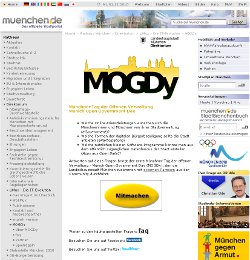
Screenshot from MOGDy website
They say a week is a long time in politics, and in eParticipation a day is just as long: Munich Open Government Day (MOGDy) is lasting, er, several months.
Starting today, the City of Munich is asking citizens to answer three questions using its dedicated online platform:
- what online services should the local government provide?
- what eParticipation initiatives should the city engage in?
- what apps could make use of the data that the city will shortly release?
Any citizen can suggest ideas and rate other people’s ideas. The five people with the top ideas will get tickets to the Oktoberfest. At the MOGDy Camp on 21st and 22nd January 2011, the city will launch its open data programme in which it will be releasing data and encouraging developers to get stuck in and create useful apps out of them. The best apps will be awarded prizes and the City will present them online.
Posted in Uncategorized | No Comments »
 |
17. September 2010 – 15:45 by Bengt Feil (TuTech Innovation GmbH)
|
One of the first steps in trying to open up the budgeting process is to present a communal, regional or even national budget into in way that is accessible for the average citizen. In most cases budgets are published as documents with hundreds of pages and enormous tables with number containing a bunch of zeros – which might be a hurdle for many people to join into a discussion about this important topic.
The German website OffenerHaushalt.de (in German), built by Tactical Tools (“a network of enthusiast and experts”), tries to address this problem by presenting the federal budget of Germany in an interactive and intuitive fashion. The picture below shows the front page with each ministries budget presented in a different colour.
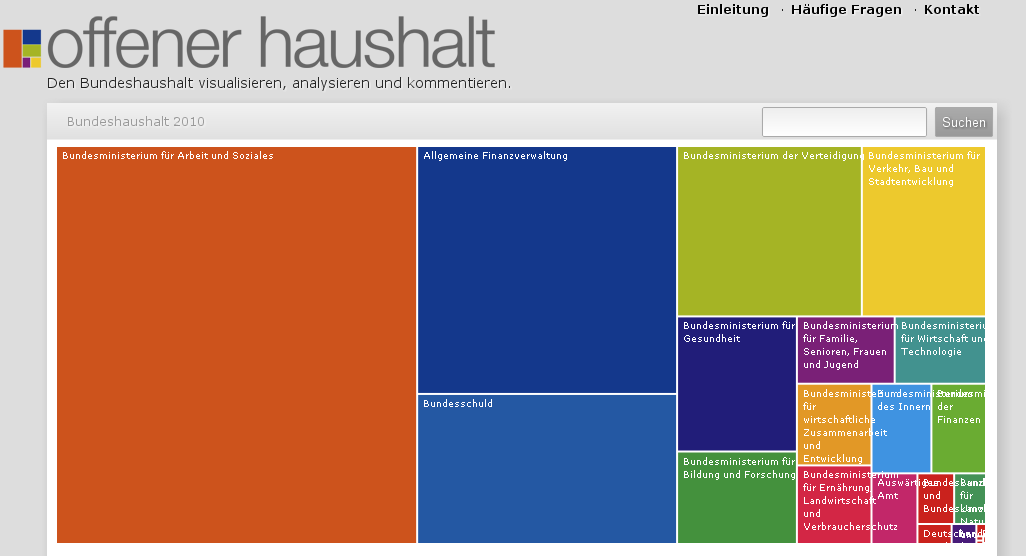
After clicking a budget (like in this case defense) the allocation of the budget to different areas and activities is shown in an easy to understand way. This way you can drill down into the budget to get a sense of its structure and how funds are used.
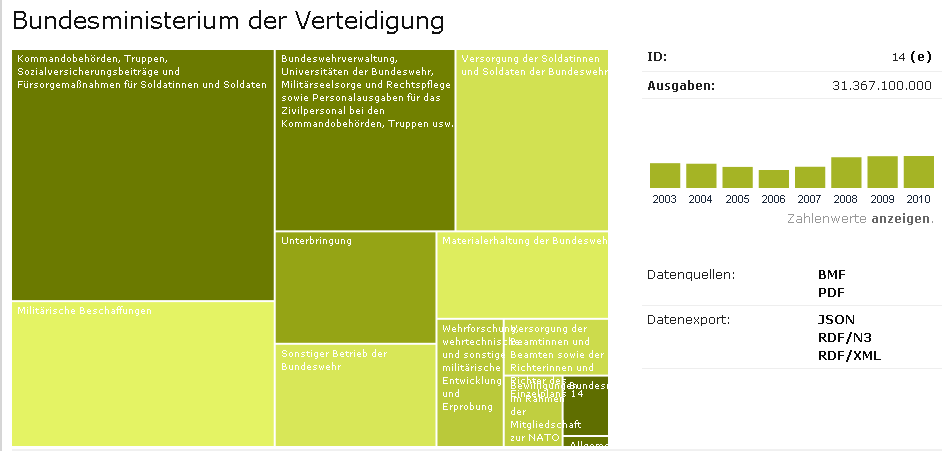
All data presented can also be exported in different standardized formats (JSON and XML among them) and all source data is also accessible. However there is also a sign for the need of more structured open data as the site is asking its visitors for hints to a machine readable version of the 2011 federal budget.
In summary this website is a great example of how to display complex numerical information in an accessible way. The ideas presented here could be integrated into eParticipatory budgeting processes to lower the barrier to entry for citizens or to help to introduce new audiences to these processes.
Posted in Tools | 1 Comment »
 |
16. June 2010 – 11:21 by John Heaven (TuTech Innovation GmbH)
|

Photo by boliston on Flickr
Whilst in hospital here in Hamburg over the weekend, I realised something that should have been obvious: Germans are masters in customer-led service design. If you had asked me last week, I probably would have said that the UK was the originator of the idea that customers and citizens can design their services to suit themselves. Now I’m not so sure… Read the rest of this entry »
Posted in Uncategorized | No Comments »
 |
1. April 2010 – 10:30 by John Heaven (TuTech Innovation GmbH)
|

By kotofoto1 on Flickr
Every morning, on my way to the underground station, I walk down a nice tree-lined lane. I think the trees feel a little taken-for-granted, though: almost all of them have some kind of banner crying out to the world how valuable they are. Slogans like “night-time owl sanctuary”, and “I filter the air!”
As a quick internet search reveals, this is all part of a protest against the local government’s plan to fell the trees. You can see a video of “Tree Night” (Nacht der Bäume), which took place on 30th September last year, on YouTube.
It seems that trees are an issue that not only Hamburgers care about: I noticed a recent article about trees that have been removed and not replaced on the Bournville Village community website. The article also contains a YouTube video, this time of a resident explaining the situation.
Both cases are examples of concerned citizens using social media, on their own initiative, to highlight local issues that are important to them and campaign for change. If you have any more such examples of “hyperlocal” media, let us have them!
***
“Nacht der Bäume” has a website all of its own (in German), as does the “Bürgerinitiative” (citizens’ action group) for Emil-Andresen-Straße. All in German, of course — that’s hyper-local for you!
For information on what “hyperlocal” means, including links to many example sites, take a look at the UK-based talk about local website.
You may also be interested in this comment piece by Jeff Jarvis in the Guardian.
Posted in Uncategorized | No Comments »
 |
15. October 2009 – 11:38 by Bengt Feil (TuTech Innovation GmbH)
|
Climate change is one of the biggest scientific, political and social problems of the 21st century. All nations of the world are challenge by the threads and to a lesser degree opportunities climate change brings with it. Consequently this topic is discussed among world leader in forums like the United Nations Climate Conference later this year. But all these efforts to mitigate the change of climate, even if there was agreement among countries on the necessity to mitigate it, will not stop the impacts of the change immediately. Therefore there is a need to look for ways to adapt to climate change and to protect humans and the environment from its negative effects.
The German ministr y for education and research has set up a series of large scale projects to research the possibilities of different urban and rural areas to adapt to climate change in the next 50-100 years. The Klimzug-Nord project will undertake this effort for the metropolitan region of Hamburg, which is influenced both by the nearby North Sea and the river Elbe. The project duration is 5 years, has an overall volume of 25 million Euro and it incorporates dozens of Universities, research centres, governmental bodies and companies. This region has 4.3 million inhabitants which will be affected by the changing climate. As the adaptation to climate change does mean major decisions in urban development and other political areas there is a need to get the cities involved in this process. This is where eParticipation meets climate adaptation.
y for education and research has set up a series of large scale projects to research the possibilities of different urban and rural areas to adapt to climate change in the next 50-100 years. The Klimzug-Nord project will undertake this effort for the metropolitan region of Hamburg, which is influenced both by the nearby North Sea and the river Elbe. The project duration is 5 years, has an overall volume of 25 million Euro and it incorporates dozens of Universities, research centres, governmental bodies and companies. This region has 4.3 million inhabitants which will be affected by the changing climate. As the adaptation to climate change does mean major decisions in urban development and other political areas there is a need to get the cities involved in this process. This is where eParticipation meets climate adaptation.
The Klimzug project does include a governance strategy which makes use of eParticipation and other participatory approaches. The use of eParticipation in this context has two major goals: Firstly to get citizens actively involved in the development of adaptation strategies and secondly to test how participatory tools and processes have to be designed in a context that covers a highly complex topic which stretches an extremely long time period. The DEMOS eParticipation approach developed by TuTech will be used in Klimzug-Nord to discuss possible projects, activities and policies to adapt to climate change as well as to gather the ideas and views of the people living in the region on how to best adapt and which priorities to be set. The different issues to be addressed by eParticipation in this project range from “how to organize water irrigation in agriculture” to “how to prevent major floods in the densely populated city area of Hamburg”.
approaches. The use of eParticipation in this context has two major goals: Firstly to get citizens actively involved in the development of adaptation strategies and secondly to test how participatory tools and processes have to be designed in a context that covers a highly complex topic which stretches an extremely long time period. The DEMOS eParticipation approach developed by TuTech will be used in Klimzug-Nord to discuss possible projects, activities and policies to adapt to climate change as well as to gather the ideas and views of the people living in the region on how to best adapt and which priorities to be set. The different issues to be addressed by eParticipation in this project range from “how to organize water irrigation in agriculture” to “how to prevent major floods in the densely populated city area of Hamburg”.
It will be interesting to see how eParticipation can help to open up a research project to the general public especially with such a complex topic at hand. We will report back on the problems and successes we encounter as we go along in this interesting and challenging project.
Posted in good practice | No Comments »
 |
13. August 2009 – 08:42 by pol-di.net e.V / politik-digital.de
|
For the upcoming German Federal election 2009, politik-digital.de, in a joint project with pro-bono TV production, published a video clip which shows various celebrities telling not to vote. You can watch the clip here (sorry, I couldn’t embed the clip):
Geh nicht hin!
For those of you who are non-German speakers, find an english article about the project on DW-World.de. This article comes along with a radio interview including a statement by politik-digital.de executive director Stefan Gehrke.
Posted in Interview, members, News | No Comments »
 |
8. May 2009 – 11:43 by Renate Mitterhuber
|
It’s almost exactly a year ago since I was at the “Neue Verwaltung” (“new administration”) conference in Leipzig and described my impressions here of how eParticipation was faring in Germany’s public administrations. The verdict in a nutshell was: there’s a fair amount on offer to executive staff from German administrations – the conference’s main target group – but the take-up has been pretty slow to date.
Today, even though the year’s still relatively young, the invitations and advance notifications for the major administrative conferences in Germany in 2009 are already fluttering one by one into my inbox. Is eParticipation in all its facets on the agenda more often or in other ways than it was last year? I’ve had a look at the four biggest German eGovernment congresses with that question in mind. After all, that’s where you’re likely to find a throng of representatives – important ones, too – of all of the German administrations, whether at national, federal state or small local authority level.
Let’s start with CeBIT 2009, which took place in early March in Hannover and which 43% of respondents in a survey of representatives of public administrations said was the IT exhibition they visited most. It was certainly interesting to see with my own eyes how, against the backdrop of the financial crisis, the Public Sector Park was experiencing an upturn that the public administration sector itself would never have thought possible, considering how it’s struggled for years to present its services from – to put it diplomatically – a less than favourable corner of the whole CeBIT site.
This year, visitors walked through many of the so-called “business halls”, where there was lots of empty space and exhibitors with plenty of time on their hands, to reach Hall 9, where it was really buzzing. So there was a good audience for a presentation of the eParticipation activities of the German public sector. But you looked in vain for anything from the federal states. The Federal Ministry of the Interior had at least allocated two of the slots in its lecture programme to the subject, each with three talks covering various areas.
I gave a talk there on Hamburg’s experiences in the field (eParticipation in Hamburg from 2002 – 2009: from a pilot project to the norm), while Matthias Trenel from Zebralog e.V. spoke about federal and other administrative discourses. PEP-NET coordinator Rolf Lührs chaired a discussion between leading politicians on the topic of “Politics 2.0” as part of the “Webciety” series.
On 5 – 6 May 2009, the “Neue Verwaltung” congress organised by the dbb-Akademie was due to place again in Leipzig. As last year, it was offering practical workshops on the topic of “Web 2.0 in public administration” and at least dedicating one of nearly 40 lecture slots to the topic of eParticipation. Entitled “eDemocracy, eParticipation and Web 2.0 – online public participation”, it promised to offer representatives of public administrations a chance to find out about new ways (to them) of applying IT. That sounds really promising and gladdens the innovative civil servant’s heart.
On 26 – 27 May 2009, the 12th “Effizente Staat” (“efficient state”) conference will be taking place in Berlin under the banner of “Change Requires Exchange”. According to the organisers, the magazine “Behörden Spiegel”, the event “has become an integral part of the transformation discussion”. If that’s the case, German administrations aren’t transforming themselves in the direction of more eParticipation, since the topic isn’t to be found anywhere.
The fourth major administration conference traditionally takes place in Berlin in the autumn: “Moderne Staat” (“modern state) whose partners include the Federal Ministry of the Interior and the KGSt (Kommunale Gemeinschaftsstelle für Verwaltungsmanagement – a federation of German municipalities and district and local authorities of all sizes concerning local management). According to the advance programme, the main focus in the eGovernment area will be on the topics of “the EU Services Directive” and the “Germany-wide common telephone number for public enquires“.
My personal verdict is that the topic of eParticipation is making up a bit of ground in the public administration community, but its significance lags way behind that of topics such as the “EU Services Directive”, IT infrastructure, IT security, IT cooperation or shared services. These are all doubtless important topics when it comes to being well equipped for the future.
Does the dominance of the classical IT topics perhaps have to do with the fact that “the internal IT departments in local authorities (…) frequently tend to fulfil the role of a simple operator, exerting little influence on how departments actually use IT”? This is what emerged from a survey conducted by the market research and consultancy company IDC in the autumn of 2008 among those responsible for IT in metropolitan authorities and rural administrative districts. They add: “In future, however, IT will become even more important for the successful structuring of administrative processes and a greater responsiveness to the needs of the public”. It is to be hoped that the message will not fall on deaf ears and that it will be given enough space.
Posted in Trends | 1 Comment »
 |
12. June 2008 – 14:24 by Bengt Feil (TuTech Innovation GmbH)
|
In 2004 James Surowiecki in his famous book “The Wisdom of Crowds: Why the Many Are Smarter Than the Few and How Collective Wisdom Shapes Business, Economies, Societies and Nations” discussed at length how collective decisions are made and that they can be much more rational and “correct” than those of a single or few experts. He uses examples form the fields of economy, politics and everyday life to support this point. I will try to describe another case where the wisdom of crowds seems to be working – participatory budgeting.
It is often stated that citizens only try to gain individual advantages and therefore are unwilling to provide ideas about how to consolidate public spending. There is also the argument that the high complexity of public budgeting makes it almost impossible for citizens to take rational and useful decisions about how to change it. But if you look at the results of participatory budgeting projects this does not seem to be the case. Read the rest of this entry »
Posted in good practice, Projects | No Comments »
 |
23. April 2008 – 16:19 by Hamburg
|
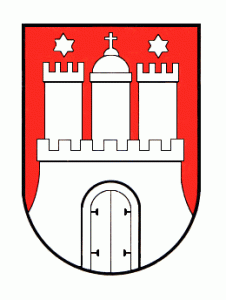
The official name “Free and Hanseatic City of Hamburg” goes back to Hamburgs membership in the medieval Hanseatic League. These are the roots of the international trade city Hamburg the commercial and cultural centre of Northern Germany. Hamburg is the second largest city in Germany and the second-largest port city in Europe. Apart from national capitals Hamburg is the most populous city in the European Union. The city, defined according to its current administrative area, contains 1.76 million and the so called Hamburg Metropolitan Area with more than 4.5 million inhabitants.
Read the rest of this entry »
Posted in members | No Comments »
 |
9. April 2008 – 10:43 by Hans Hagedorn
|
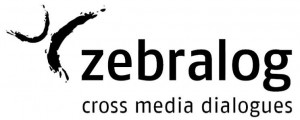
Zebralog is a not-for-profit organization that supports modern democratic decision making through the use of interactive media. Zebralog offers every service that is needed to run online dialogues: institutional embedding, marketing, technical backbone and moderation.
For more information please visit:
www.zebralog.de
INSERT_MAP
Posted in members | No Comments »







 approaches. The use of eParticipation in this context has two major goals: Firstly to get citizens actively involved in the development of adaptation strategies and secondly to test how participatory tools and processes have to be designed in a context that covers a highly complex topic which stretches an extremely long time period. The
approaches. The use of eParticipation in this context has two major goals: Firstly to get citizens actively involved in the development of adaptation strategies and secondly to test how participatory tools and processes have to be designed in a context that covers a highly complex topic which stretches an extremely long time period. The 







